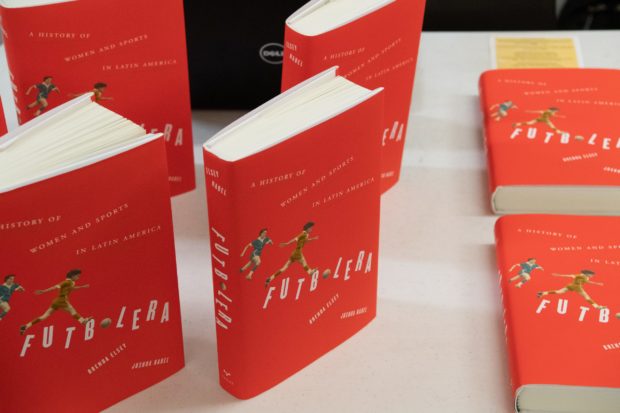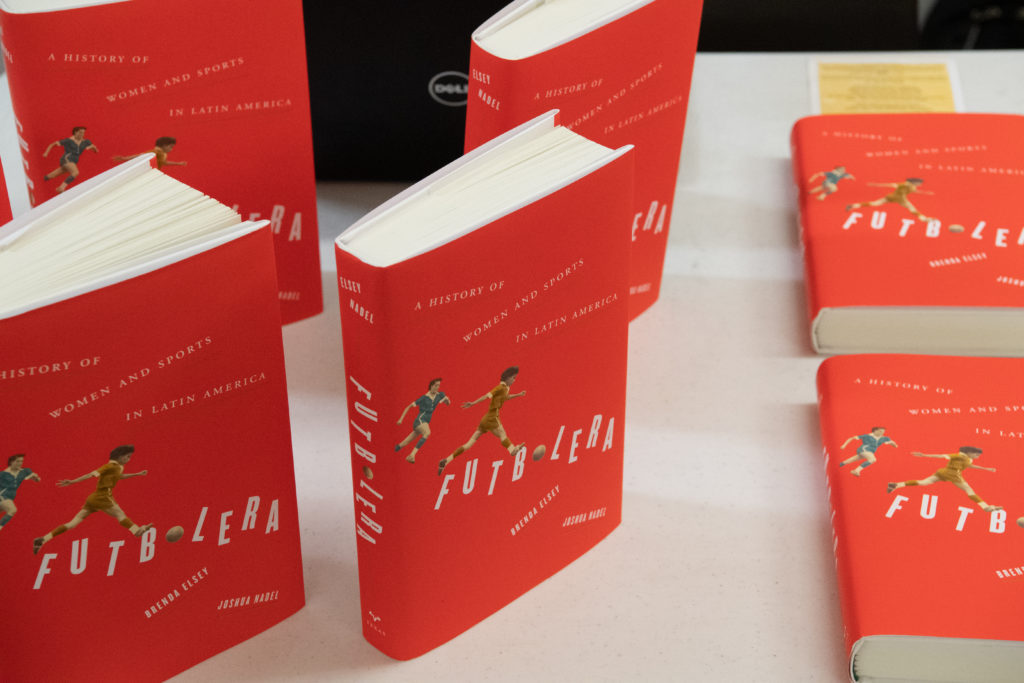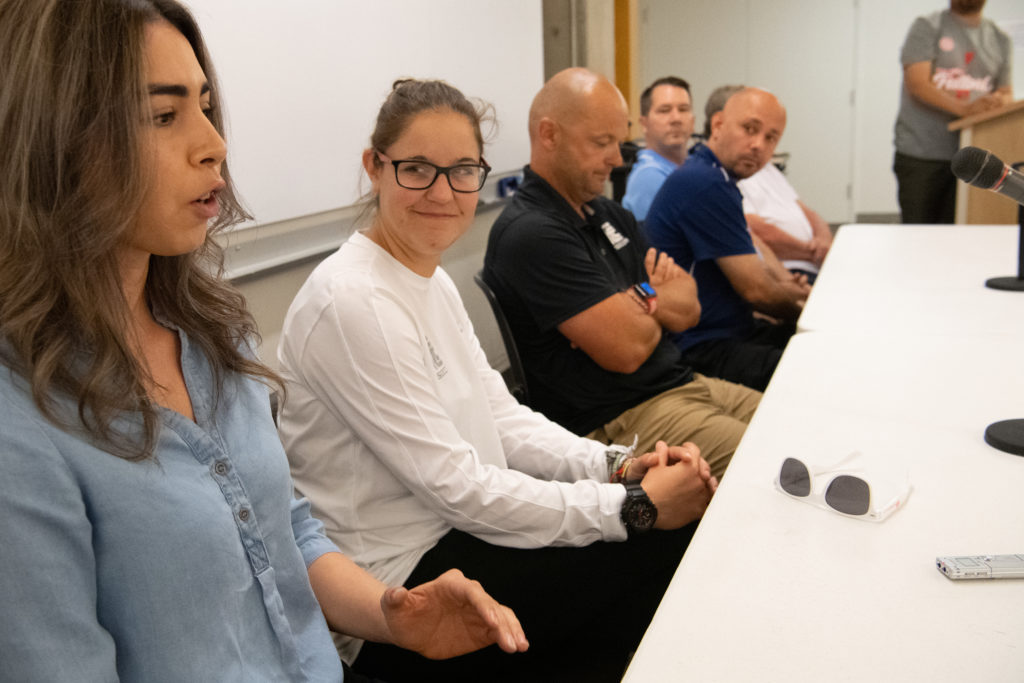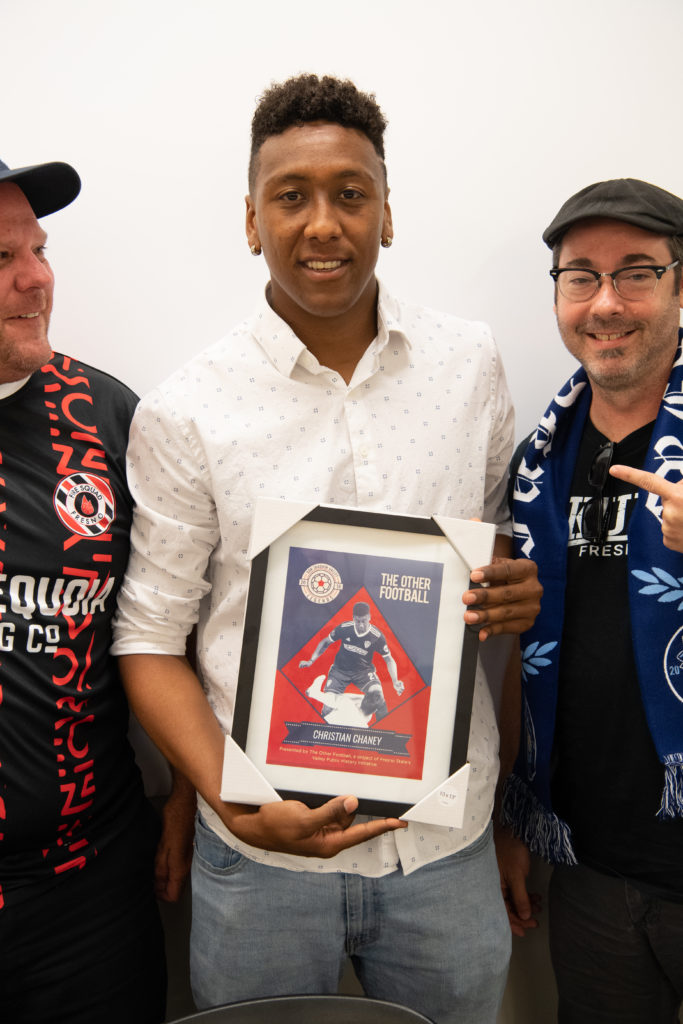
By Peter Maiden
The Valley Public History Initiative, also known as Historia Pública, is building an archive of materials related to Central Valley soccer. The project is called “The Other Football.” On April 27, they held a conference at Fresno State called “Roots and Routes: Fresno’s Global Soccer History.” Historia Pública is headed by Dr. Romeo Guzmán, a professor at Fresno State.
“We’re really trying to revolutionize the way history works,” said Dr. Guzmán in his opening remarks.

Copies for sale of the book Futbolera: A History of Women and Sport in Latin America, by Joshua Nadel and Brenda Elsey.
From the left: María Magaña, goalie; Christina Monreal from Fresno City College; and Tim Carroll, coach of the Fresno FC Ladies.
Joshua Nadel
The students working with Historia Pública are doing research papers related to soccer here, as well as taking oral histories and gathering and scanning photographs and documents. Also, Historia Pública made trading cards of prominent soccer figures from the Valley, and more than 3,000 have been distributed to the community. That is not standard historiography.
The centerpiece of the conference was a panel called “Women’s Soccer: Past and Present.” Panelist Tim Carroll was until recently the head coach of the Fresno Football Club Ladies, a semipro team under the wing of the fully professional Fresno Football Club. The Fresno Football Club is also known as the Foxes, or the Zorros.
A few months ago, the women had their 2019 season canceled. Carroll said, “There is a definite need for having a women’s soccer team. I get phone call after phone call from women players asking me if they can play, and I’m like ‘Sorry, we don’t have a team this year.’ We don’t have the funding, or the support from Fresno FC that we had hoped for; they put us on a hiatus.”
Fresno FC Ladies was owned by Alexander and Lisa Ott, who had the rights to its Women’s Professional Soccer League franchise, while Fresno FC managed the club. The Otts moved to Texas and no new owners were found. That support was not forthcoming.
Fresno FC’s management blamed this on high expenses for the men. Fresno FC put its Player Development League team for under-23s on hiatus as well.
It could be easier for the women’s team and the PDL if Fresno FC builds a new stadium where they could train and play. They are still looking for a site and the last that was heard from them about it was that they were considering something near Chukchansi Park, where the Foxes are currently holding their games, or possibly a site in Madera. Perhaps neither will work out; the future is unclear.
Fresno State student Edna Ortega covered the local women’s soccer landscape in a short lecture, and she related some stories about the inception of local women’s collegiate soccer here. At the outset, Ortega said that soccer is an excellent sport for women, in part because “size doesn’t matter so much.”
Fresno State had a women’s club team in the 1990s, but no official school team (while there was one for the men). In 1994, Fresno State faced several Title IX lawsuits.
Title IX was legislation passed in 1972 that read: “No person in the United States shall, on the basis of sex, be excluded from participation in, be denied the benefits of, or be subjected to discrimination under any education program or activity receiving Federal financial assistance.”
The legal actions against Fresno State forced the school to develop a full women’s soccer program. According to Ortega, the team has flourished. It has won several women’s championships.
Ortega also told the audience how, in 1998, a new student at Fresno Pacific University, Michele Cummings, was the driving force behind starting a women’s soccer team at the school. Cummings chose Fresno Pacific for religious reasons, but while she had a strong desire to play soccer—which she had done successfully in high school—Fresno Pacific had no program.
She set out to convince Coach Jaime Ramirez to start a women’s club team, which he did in 1998. In 2001, it was recognized as a school team. “It’s a story of what a determined person can achieve at the collegiate level,” said Ortega.
María Magaña was on the panel. Her life as a goalie has been special. A trading card was made of her as part of the deck produced by Historia Pública. Though she’s from Reedley, she’s been playing recently with a professional women’s team in Iceland.
When she was in middle school, she recalled, she was the tallest girl, so one day she was asked to play in goal, but 12 goals were scored on her. She went to playing midfield. Then somehow, in her sophomore year, she was back in goal.
Magaña said her mom would say, “What are you doing at practice that you come home with so many bruises?”
“My dad was getting mad at me too,” she added.
Her dad told her, “What are you doing, you should be at home!”
“My mom eventually came around,” she said. “I told her ‘This is what it takes for a goalkeeper! I’m going to go and give my all!’”
Her senior year she was Most Valuable Player on her team, and in January that year she was School Athlete of the Month. She went and played at Fresno City College (FCC), as did many successful young women; FCC is known for having an excellent program.
UC Irvine awarded her a soccer scholarship because of her outstanding play. Her dad gave her a hard time for going out of town, to Irvine, and then when she went to Iceland, he cried. But her mom stood up for her, saying she was grown and needed to make her own decisions.
“At the end of the day, it was just going and giving 100%,” Magaña said. “Like, for a reason you’re there, and it is only if you’re going to take it and run with it [that it will work]. I could have cried and gone ‘You know what I’m not going to become a goalkeeper,’ looking back at those 12 goals. I moved on. You get scored on, it’s ‘You live and you learn.’”
The people speaking at the conference included eight men and three women. The shortage of women speaking about women was notable.
Dr. Guzmán said, “I hoped to have more parity and I invited two additional women to the panel, but unfortunately they were unable to make it work…There are four women’s collegiate teams in Fresno, and they are all coached by men. It’s very common for men to coach women, but not the other way around. Our panel included coaches and former coaches who have been involved with women’s soccer.”
The conference ended with keynote speaker Joshua Nadel, co-author with Brenda Elsey of a new book called Futbolera: A History of Women and Sport in Latin America. Nadel and his co-author met at an international academic conference on sports. That conference featured the presentation of 140 papers, of which three had to do with women’s sports, including one each by Nadel and Elsey. They connected and the idea of the book was born.
Nadel’s one-hour lecture covered many issues talked about in Futbolera. One illustrative story he told was about the early years of women’s soccer in Brazil.
Nadel focused on the relationship of the press to women’s soccer. The press not only recorded facts but also helped build the social networks key to the development of the sport.
At first, coverage was hit and miss. Women’s soccer became part of traveling circuses, drawing crowds in the thousands, as a kind of spectacle. Later, teams were formed at various factories.
In the 1930s, middle- and upper-class women got involved. The sports newspaper, Jornal de Sports, covered women’s soccer and helped organize league play. However, there was also some press that sought to repress women in the sport.
“Soccer flew in the face of dominant ideas of the day regarding women’s fragile nature,” Nadel said. There was propaganda about soccer promoting “aggressiveness” in women and causing damage to their “delicate physiology.” It was said their legs were becoming “overdeveloped.”
Women who played soccer were moving into a male domain; they were challenging patriarchy. In 1941, the Brazilian government banned women’s soccer, and that ban stayed in effect until 1983. During that time, women’s soccer in Brazil essentially disappeared (although there was still some play that went on under the radar).
Nadel’s writing partner, Elsey, is a co-host of a podcast on women in sports called “Burn it All Down” at burnitalldownpod.com.
*****
Peter Maiden is a staff photographer for the Community Alliance newspaper. He studied media at UC Berkeley. Contact him at maidenfoto1@gmail.com.



